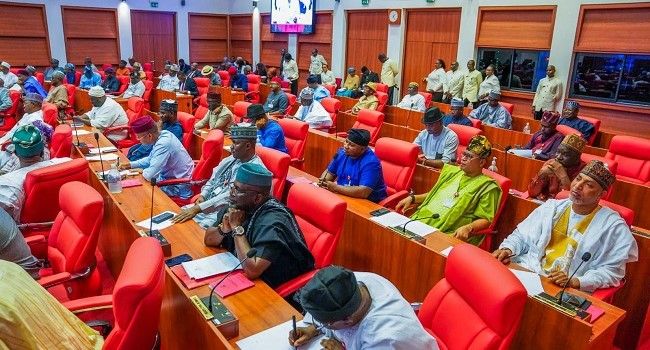
Lawmakers warn new tax regime could erode investor confidence and trigger further sell-offs…
The Nigerian Senate has called on the Minister of Finance and Coordinating Minister of the Economy, Wale Edun, to urgently review the 30 per cent Capital Gains Tax (CGT) on large share disposals following a ₦2 trillion loss in market value on the Nigerian Exchange Limited (NGX) last week.
The tax increase, introduced under the recently passed Nigerian Tax Act 2025, raises CGT on share transactions worth ₦150 million and above from 10 per cent to 30 per cent, with implementation scheduled to begin on January 1, 2026.
Chairman of the Senate Committee on Capital Market and Institutions, Senator Osita Izunaso, made the appeal on Wednesday while presenting a paper titled “Redefining the Rules: The Investment and Securities Act 2025 and the Future of Nigeria’s Capital Market” at the Moneyline with Nancy Investment Forum 2025 in Abuja.
Izunaso warned that the sudden policy change has shaken investor confidence, prompting a wave of panic sales that wiped out over ₦2 trillion in market capitalization within a week.
“The increase in Capital Gains Tax on share sales above ₦150 million is worrisome,” he said. “In anticipation of this change, we have observed significant disposals by major investors, resulting in a notable decline in market capitalization over the past few days.”
He commended President Bola Tinubu for revitalizing Nigeria’s capital market since 2023 through reforms that strengthened macroeconomic stability but urged caution in implementing new fiscal measures.
Senate to Engage Finance Minister
Izunaso said while taxation remains crucial for government revenue, fiscal policies must be structured to avoid undermining investor sentiment or discouraging long-term investment.
“While taxation is essential for revenue generation, it is equally critical that fiscal measures do not inadvertently undermine investors’ confidence or discourage long-term capital formation,” he stated.
The lawmaker disclosed that the Senate Committee on Capital Market would engage the Finance Minister to explore mechanisms that could mitigate the impact of the new CGT framework and restore market confidence.
He suggested that the Ministry of Finance delay implementation of certain provisions in the Act, particularly those that could destabilize the capital market.
“We are aware that the new law is supposed to commence by January 2026. But we are suggesting that some provisions should only take effect when advised by the Honourable Minister. This particular tax adjustment should not commence on January 1, because it is already affecting the market,” Izunaso advised.
Background and Government Clarifications
The Chairman of the Presidential Committee on Fiscal Policy and Tax Reforms, Taiwo Oyedele, had earlier clarified that the new Capital Gains Tax regime would not apply retroactively to investment profits earned before 2026.
According to the committee, the updated framework includes a cost-basis reset and grandfathering clause designed to protect existing investments and ensure only new gains realised after January 2026 are taxable.
Meanwhile, Finance Minister Wale Edun has assured stakeholders that the government will adopt a cautious and consultative approach in rolling out the tax reforms, particularly the contentious CGT on securities transactions.



